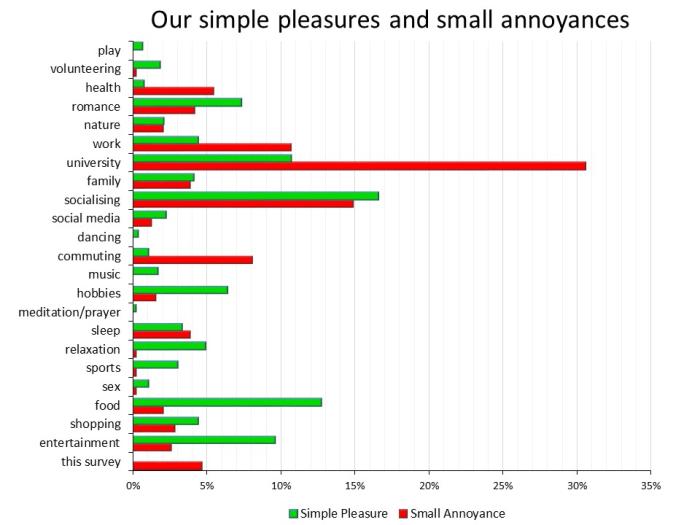Researchers have found that simple pleasures can offset life’s daily irritations and keep us focused on our goals. Associate Professor Nicole Mead says it is as simple as walking away from the task at hand, take a breather, enjoy something and then rejoin with a clear frame of mind.
Using a unique real-time survey method, researchers have for the first time found that experiencing more simple pleasures during the day is related to making better progress on personal goals. They also found that having a bad day full of annoyances derails people from their goals, but that the negative effect of such annoyances can be completely cancelled out if people experience a counter-balancing high number of simple pleasures.
The study’s lead author, Associate Professor Nicole Mead from the University of Melbourne, says the results have implications for workplace productivity and stress management. There are even implications for advertising, which often markets pleasures as temptations or indulgences rather than as something constructive.

“Promoting the benefits of simple pleasures could be a workplace intervention to help people towards achieving work goals,” says Associate Professor Mead, who first started the research with colleagues when she was at the Rotterdam School of Management at Erasmus University in the Netherlands. “By acting as buffer against small annoyances, simple pleasures could also help people to fortify themselves psychologically to deal with stress and take on challenges.”
The study has been published by the University of Chicago-based Journal of the Association for Consumer Research and included collaborating researchers from the Bauer School of Business at the University of Houston and the Social Cognition Center Cologne at the University of Cologne.

“People intuitively think pleasure gets in the way of achieving goals like meeting a deadline, so people tend to brag about how hard they are working and how little sleep they are getting to reassure themselves that they are working hard. But we all know that if you work too hard you can risk burning out,’’ says Associate Professor Mead, from the Department of Management and Marketing at the Faculty of Business and Economics.
“We wanted to test whether simple pleasures could actually help people achieve their goals.”
They recruited 122 students and staff at Erasmus University to participate in a six-day survey to monitor the number of simple pleasures and annoyances that they experienced during the day. They then compared that with the evening reports the participants submitted on how far they had gone towards achieving their goals that day.
To counter the tendency of people to forget the good things that happen to them while remembering the bad, the researchers designed the survey to be completed online several times a day using mobile phones. That way the memory of the experience was still fresh. Participants were prompted by text message five times a day and given a window of 30 minutes to record the simple pleasures and small annoyances they had experienced since they were last prompted.
The researchers left it up to participants to decide what a simple pleasure was and what constituted a small annoyance. The only guidance they gave was the experience needed to be commonplace or mundane.

The results found a significant correlation between experiencing a high number of simple pleasures and goal progress. They also found that small annoyances only detracted from goal progress when people experienced few simple pleasures. When people recorded many simple pleasures, small annoyances had no impact on goal progress
The most commonly recorded simple pleasure was socialising, followed by food, university, entertainment, romantic relationships and hobbies. Interestingly, what some people found pleasurable was annoying for others.
The most common small annoyance for example was university, followed by socialising. Romantic relationships were also a bother for a significant number of people. Other annoyances that feature significantly were work, commuting and health. Amusingly, the survey itself proved a relatively common annoyance, accounting for almost five per cent of all recorded small annoyances.
“Our results suggest that the real power of simple pleasures that make us feel good seems to come from when things aren’t going well. A simple pleasure seems to restore people’s psychological reserves to do well,” says Associate Professor Mead.
She says further research is now needed to go beyond the correlations they have found and further test the hypothesis. She notes for example that further tests could be developed to control for some people being naturally disposed to recording more simple pleasures than others.
Associate Professor Mead says the research provides an antidote to Western society’s traditionally hostile view of pleasure in which self-denial and toil are promoted as virtues and pleasure-seeking is seen as a vice.

She says the idea that pleasure leads to destruction goes back at least to the Ancient Greeks and their stories of the sirens, creatures whose beautiful voices lured sailors onto dangerous rocks. The Greek hero Odysseus (or Ulysses) has to go to elaborate lengths to hear the beautiful siren song by having his crew block their ears with wax while he is tied to the mast to stop him from jumping overboard to his death.
“Suspicion towards pleasure is deeply ingrained in the Western culture. But people are now taking a more compassionate approach to their lives. After all, we aren’t robots. It is probably better to accept that we have desires and use them in positive ways rather than try to deny them. And our research suggests that enjoying some simple pleasures can actually help you in achieving your goals.”
This article was first published on Pursuit. Read the original article.






















Add Comment